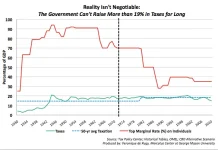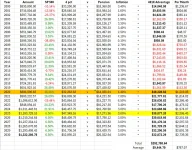@Visbek, because I like geeking on this stuff, I went back and ran a * very * rough simulation of what the above numbers would look like.
- Now, again, this is a 401(k) built up over half of my time working for that employer, v a pension that accumulated over the full time working for that employer.
If we assume a retirement age of 60, and that I live another 20 years, and my wife another 10 after that, that means these things have to support us over 30 years.
So, I figured, let's withdraw the standard 4% from the account every year, and stack that up against the Pension. I pulled SP 500 returns from
here to track the growth (and occasional shrinkage!) of the TSP, and pulled inflation numbers from
here to make the pension grow with inflation, for an apples-to-apples comparison, and backward-cast for 30 years of coverage, starting in 1993 and ending last year. After 20 years, I die, and my pension gets cut in half (that's the year that's highlighted orange).
It stacked up pretty well:
View attachment 67537639
Overall, my TSP / 401(k) brought me and my wife $864,980.61 more in our retirement than we got from the pension, and there was not a single year where the TSP / 401(k) underperformed the pension (though it got closer in 2009, after the 2008 market crash, when the TSP / 401(k) only produced $2,131.05 more than the pension did).
And, of course, when
she dies, my kids get $1.76 million
It's pretty easy to see how you can wiggle the years to produce a couple of years in which the 401(k) / TSP underperforms. If I changed retirement date to 2000, for example, and assume a 6.5% rate of return and 3% inflation rate for years 2025-2030 for my wife (
which are both worse than likely: 6.5% is below average returns, and inflation for this year is looking like around 2.6%), the TSP underperforms the pension for most of the time I am alive
**, and only really begins constantly outperforming the Pension for the rest of its existence after my I die. In that case, the 401(k) / TSP only outperformed the Pension by about $122K over our lifetimes, for an average of about $330 a month more. Not bad for a TSP that was built up over 10 years, versus a pension built up over 18.
And, of course, we are still left with just
over $1 million to give to our kids. As opposed to the pension, which gives them... zero.
**And, of course, this can be ameliorated by having an emergency fund to draw on instead of your investments during a downturn, which, you really should do, or, if you feel like it, picking up a twilight job to cover the bills while you are still in the putter-around phase and the market recovers. My parents don't need money, but they did this anyway, working at a local theater because it lets them see all the shows, and gets them out of the house, while still allowing them flexibility to do what they want in retirement.
...Overall, even if we produced a worse-case scenario for the post-war period (retiring in the teeth of the dot-com bubble burst + 9/11, just before the 2008 market meltdown), the TSP / 401(k) option is still net superior.
Then consider what it would look like if we had a full 18 years of investments in the TSP, instead of merely 10 (bumping that 680K to about 830K), to make it a
truly apples-to-apples comparison:
View attachment 67537649
And in the retire-into-the-teeth-of-the-downturn scenario:
View attachment 67537652







